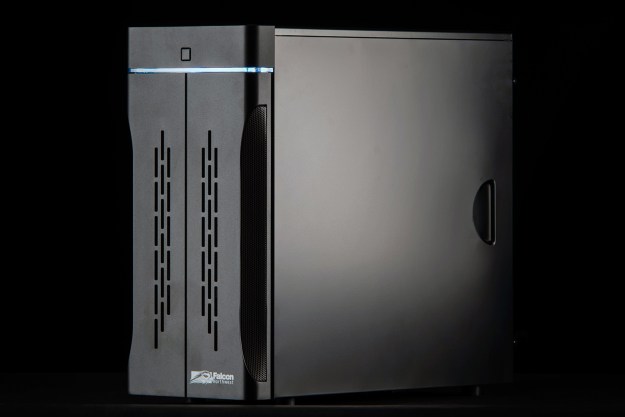
“Falcon Northwest’s Talon is a great pick among compact enthusiast PCs, but its outdated case and irritating fan keep it from earning top honors.”
- Compact case
- Strong performance
- Intuitive interior layout
- Fan noise can be irritating
- Enclosure is showing its age
Skylake shootout
We pitted this system against four other Skylake desktops. For the full scoop, including processor and gaming benchmarks, check out our comparison.
While hardware has become more efficient in recent years, enabling more compact builds, most enthusiast PCs still suffer a case of gigantism. That’s not true of the Talon, a mid-tower actually worthy of the designation. It’s about two-thirds the size of many competitors and can easily fit under any desk.
Going small doesn’t seem to impact the Talon’s performance at all. In our tests it easily kept up with larger competitors because it offered the exact same hardware. While there’s a bit less interior space for future upgrades, the Talon still offers more room than most enthusiasts will ever need.
Yet the size of Falcon’s system does seem to catch up to it in one area – fan noise. We noticed the system put out more than any of the competitors we tested, sometimes by a margin of up to five decibels. That’s an extremely noticeable difference.
The Talon isn’t inexpensive, either. It tends to be a bit more than comparably equipped systems. While Falcon’s build quality and attention to detail is excellent, this enclosure has been in use for several years, and is starting to show its age. Still, the Talon is a good pick for anyone who wants incredible performance in a small package.
Highs
- Compact case
- Strong performance
- Intuitive interior layout
Lows
- Fan noise can be irritating
- Enclosure is showing its age
Editors' Recommendations
- We might have an answer to Intel’s crashing crisis
- MSI has a new flagship PC that is absolutely gorgeous
- CyberPowerPC is selling a gaming PC with the first discrete Intel graphics card
- LED lighting finally arrives on Falcon Northwest’s Talon gaming desktop redesign



